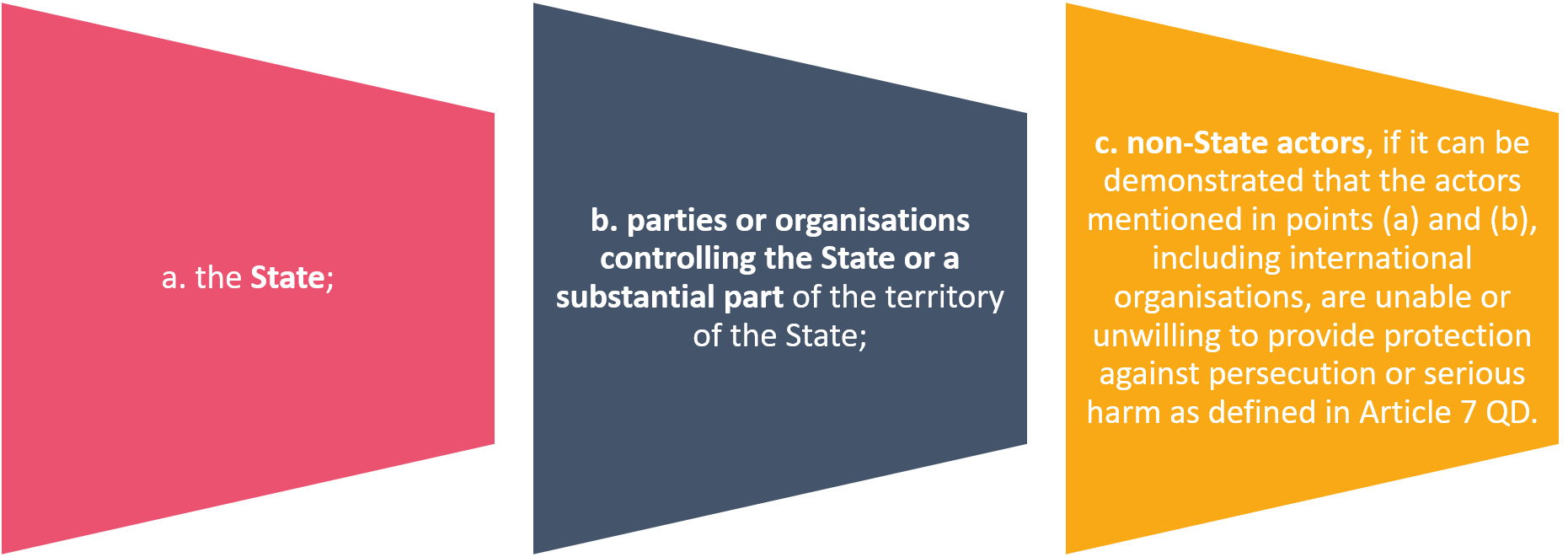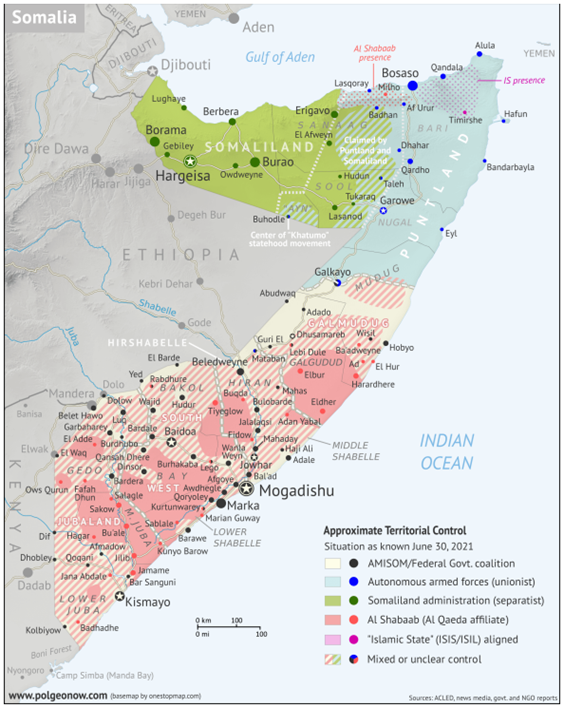GUIDANCE NOTE
Last updated: June 2022
Risks to which a population of a country or a section of the population is generally exposed do not normally create in themselves an individual threat, which would qualify as serious harm (Recital 35 QD). Generally, persecution or serious harm must take the form of conduct of an actor (Article 6 QD).
According to Article 6 QD, actors of persecution or serious harm include:
Figure 1. Actors of persecution or serious harm.

This section includes guidance concerning some of the main actors of persecution or serious harm in Somalia. The list is non-exhaustive.
Their reported areas of control, as of 30 June 2021, are presented on the map below:
Figure 2. Somalia - Approximate Territorial Control, 30 June 2021 by Political Geography Now (https://www.polgeonow.com/).

- Federal government of Somalia (FGS) forces: FGS has pushed Al-Shabaab out of many urban centres in South-Central Somalia. FGS security forces consist of four entities: Somali National Army (SNA), Special Forces, National Intelligence and Security Agency (NISA) and Somali Police Force (SPF). FGS security forces have committed a wide range of human rights violations, including extrajudicial killings, arbitrary arrests and detentions, (conflict-related) sexual violence and enforced disappearances. The severe violation of rights of children by FGS forces, such as deprivation of liberty for alleged association with Al-Shabaab or ISS, child recruitment, sexual violence, killing and maiming, has been also reported.
- Jubbaland forces: since 2012, state President Ahmed Madobe, and his militia group, have been in charge of the town and the port of Kismayo, of which they also control the surroundings. A large portion of the regional state is under the de facto control of Al-Shabaab. The United Nations Secretary General (UNSG) has attributed to the Jubbaland security forces several violations, such as assassinations, conflict-related sexual violence, violations of human rights and international humanitarian law, deprivation of liberty of children, child recruitment, killing or maiming of children, rape and sexual violence against children, and denial of humanitarian access.
- South-West forces: in terms of territorial control, the South-West state remains among those most affected by Al-Shabaab’s presence and attacks. The group controls large swathes of territory in all three South-West regions. UNSG attributed to South-West forces violations such as conflict-related sexual violence, arbitrary arrests of journalists, child recruitment, deprivation of liberty of children, killing and maiming of children, rape and sexual violence against children, attacks on school and hospitals, and child abduction.
- Benadir/Mogadishu forces: the region of Benadir covers the same area as the capital Mogadishu and it is officially controlled by the FGS security institutions and AMISOM. See section 1.1 Federal Government of Somalia (FGS) forces.
- Hirshabelle forces: a significant portion of the state territory is controlled by Al-Shabaab. Hirshabelle security forces have been reported to commit human rights violations.
- Galmudug forces: Galmudug state comprises Galgaduud and approximately half of Mudug administrative regions. Numerous actors compete for power such as Ahlu Sunna Wal-Jama’ah (ASWJ), an armed Sufi group which used to be the most powerful military actor in the state and was later almost completely demobilised and integrated into Galmudug’s forces and the national army. It has been reported that Al-Shabaab continued to control part of the Galmudug state.
UNSG attributed to Galmudug security forces violations such as the deprivation of liberty of children, child recruitment, killing and maiming of children, rape and sexual violence against children, attacks on schools and hospitals, child abduction, and denial of humanitarian access.
- Puntland forces: Puntland is reportedly ‘the most stable and most developed state in the union’. Puntland comprises Nugal and Bari regions. Puntland also controls the northern part of the Mudug region and contends with Somaliland over control of areas of Sool and Sanaag regions and of the area of Ayn (Togdheer region). Puntland’s security forces are constituted by the Border Police, the Puntland State Police (PSP), Intelligence forces and Correctional forces. Among them, Puntland Maritime Police Force (PMPF) is funded by the UAE and Puntland Security Force (PSF) was set up by the US as a separate private auxiliary group. UNSG attributed to PSF violations such as the execution of a death sentence, the issuance of death sentences, conflict-related sexual violence, arbitrary arrests of journalists, deprivation of liberty of children, child recruitment, killing and maiming of children, rape and sexual violence against children, and denial of humanitarian access affecting aid delivery to children.
- Somaliland forces: it has been reported that the government of Somaliland exerts consistent control over most of the territory that it claims. Areas of Sool and Sanaag regions and the area of Ayn (Togdheer region) are contested between Somaliland and Puntland. Security forces of Somaliland are constituted by the National Intelligence Service (NIS), the Somaliland Police, the Somaliland National Armed Forces, and the Somaliland Coast Guard. Somaliland security forces were deemed responsible for various violations such as the execution of death sentences, torture, beatings and harassment of civilians, and the deprivation of liberty of children.
- Al-Shabaab: Al-Shabaab is an Islamist Sunni Salafi jihadist armed group based in Somalia and seeks to establish an Islamic caliphate in the country. Its main unifying idea is the ‘opposition to the Western-backed government’. While the group controls large swathes of rural territory in central and southern Somalia, its level of penetration and influence has further widely permeated Somali society. It also retained operational military capacity in Puntland and in Somaliland, as well as presence south of Puntland.
It has been reported that the Jabahaat, Al-Shabaab’s military wing, had an estimated 5 000 – 7 000 active fighters in 2020. The Amniyat is the intelligence and counter-intelligence agency of Al-Shabaab used to undermine local governance and enforce Al-Shabaab rules in enemy territory.
In the context of the conflict against anti-Al-Shabaab forces, Al-Shabaab committed the majority of the severe human rights abuses reported during the reference period, including attacks on civilians, targeted killings, disappearances, rapes and conflict-related sexual violence. The group also blocked humanitarian assistance, recruited child soldiers, and restricted freedom of speech, press, assembly, and movement.
Checkpoints taxation, business extortion, imports taxation at major seaports, and real estate companies are multiple sources of funds for the group. Al-Shabaab also operates its own justice mechanism in areas under its control and also elsewhere via mobile courts, and may impose severe punishments.
- Clans and clan militias: clan militias are important actors of political life across Somalia. A clan militia is generally an armed group based on lineage and the result of the convergence of several individuals’ interests. Clashes can occur between and within clan militias. Numerous violations were attributed to clan militias, including killings, torture, sexual violence, child recruitment, attacks on schools and hospitals, abductions, and denial of humanitarian access.
Clan members have also been involved in clan revenge, killings and blood feuds.
- Islamic State in Somalia (ISS): formed in October 2015, the Islamic State in Somalia (ISS or otherwise known as ISIS-Somalia) is a jihadist Islamist group. The group secured a base in Puntland and has expanded its activities to other parts of Somalia. In 2020, the group conducted small-scale IED attacks and killings in Puntland, Mogadishu and Lower Shabelle. The group has regularly clashed with Al-Shabaab, while operationally and ideologically challenging its dominance.
As of mid-2018, it was estimated that the group had 200 fighters throughout the country, almost all in Puntland. In 2020, 30 fighters, including seven foreign fighters, joined the group in Bari region.
- AMISOM: the African Union Mission in Africa (AMISOM) is a multidimensional and multinational peace support operation with nearly 20 000 forces on the ground. AMISOM is tasked to reduce the threat posed by Al-Shabaab and other armed groups, to support the transfer of security responsibilities from AMISOM to Somali Security Forces (SSF) and to assist the FGS, FMS and SSF in providing security for the political process at all levels.
According to UN reports, AMISOM’s overall conduct with regard to international humanitarian law and human rights law standards has improved in the last few years. In 2020, AMISOM was listed among the actors conducting extra-judicial killings of civilians and its forces were implicated in rapes and other unspecified grave abuses of human rights while conducting military operations against Al-Shabaab.
- AFRICOM: the United States Africa Command (AFRICOM)’s East Africa Counterterrorism Operation seeks to ‘disrupt, degrade, and deny victory to Al-Shabaab and ISS in Somalia and neighbouring countries’. As of January 2021, the US military troops in Somalia had mostly withdrawn from the country. AFRICOM was particularly engaged in drone and airstrike campaigns, resulting in casualties.
- In specific situations, other non-State actors of persecution or serious harm may include the family or family/clan members (e.g. in the case of FGM, domestic violence, violence against LGBTIQ persons) or criminal groups.

